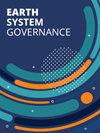Architecture and agency for equity in areas beyond national jurisdiction
Abstract
The United Nations (UN) Sustainable Development Goals (SDGs) and the UN Decade of Ocean Science for Sustainable Development (Ocean Decade) bring increased attention to various aspects of ocean governance, including equity. One of the Ocean Decade's identified challenges is to develop a sustainable and equitable ocean economy, but questions arise about how to conceptualize the multiple dimensions of equity in an ocean context. These questions become more complex as activities move away from coastal ecosystems and communities into off-shore Areas Beyond National Jurisdiction (ABNJ), where ocean resources are recognized simultaneously as unowned/open access and as common heritage. In this paper, we mobilize the Earth System Governance analytics of ‘architecture’ and ‘agency’, to reflect on the possibilities for equity in ABNJ. Motivated by the general attention to equity in UN initiatives like the SDGs and the Ocean Decade, we describe current UN architecture for ocean governance, including principles that might support equity. Existing UN architecture focuses on distributional equity among nation states, with less attention to recognitional or procedural equity. State actors have most agency, while non-state actors can exercise some via broad UN declarations and through mechanisms like ‘major groups.’ We use on-going negotiations in the International Seabed Authority on rules for mineral exploitation and in the Intergovernmental Conference on an international legally binding instrument under UNCLOS on the conservation and sustainable use of marine biological diversity of Areas Beyond National Jurisdiction to illustrate how existing architecture shapes possibilities for equity in ABNJ. As new governance possibilities are imagined, attending to existing architecture and agency can help avoid further entrenching existing power imbalances and unwittingly reproducing or exacerbating inequities.

 求助内容:
求助内容: 应助结果提醒方式:
应助结果提醒方式:


